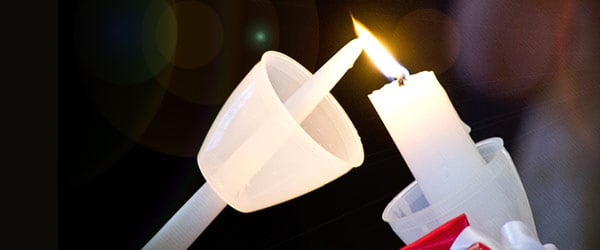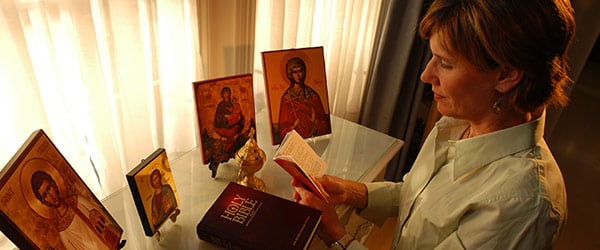In peace let us pray to the Lord,” is a refrain that continually echoes in our ears as Orthodox Christians. What are we to pray for, once we have found peace? “For the peace from above, and for the salvation of our souls, let us pray to the Lord.” And again, “For the peace of the whole world, the good estate of the holy churches of God, and the union of all, let us pray to the Lord.”
Truly, the Divine Liturgy of St. John Chrysostom is a pure testament to the life in Christ, the Spirit-filled life, the summation of worship and praise of the Triune God. And this Liturgy shows us the importance of peace as both a prerequisite to prayer, and as one of the most important objects of our prayer.
If it is hard to pray in our day and age, it is because we have only partially the peace upon which prayer depends, and because we have only a small portion of the belief that God can restore our inner world and our outer world to peace. We lead full lives, but lives that lack certain dimensions of freedom; we describe ourselves as servants, who “have so much to do.” We seem to know so much about the complexities of the world’s sorrows, the obstinacy of others and the practical difficulties of addressing both. We may actually not believe that it is prayer above all that brings peace.
Where are we to find the peace that precedes prayer, as well as the faith that prayer itself will bring peace? For each person, the answer is somehow different. For one Christian, it is the memory of a treasured elderly relative whose devotion to Christ was unshakeable. For another person, it is reading the Gospels and the Epistles that brings such peace. Another person takes comfort in the lives of the saints, or in miracle stories, or in nature’s mute yet overpowering testimony to God’s goodness. Still another person looks upon the stories of those who do good in the world, while yet another finds that the key to a prayer life is to light the oil candle, prepare the incense burner and gaze upon holy icons. For other people it is the chanting in the Church that brings them the peace they need to pray. Some of us find that fasting is an indispensable aid to prayer. Or we may find that, for us, the key to prayer is communal support, that we need another person to push us along.
Whatever preparation it is that helps us toward prayer is always a blessing, as St. Porphyrios said, “to warm up the heart before prayer.” It is good to gather our thoughts, arrange our surroundings, and allow our troubled minds to descend into our deepest heart. There we find Christ, the object of our prayer, and the author of our hope. In our hearts we find the treasure of the grace we each received at baptism, a treasure that the more it is spent, the more it increases, and which can never be exhausted. “The Kingdom of Heaven is within you,” says our Savior.
Prayer then becomes a simple and artless affair. “We look at him, and he looks at us,” said Anthony Bloom (who is considered by many to be a saint). We are tempted to bring up all our problems at once, to insist on describing them in detail and to press for immediate answers. We should try to resist this urge, and sit quietly with our Lord. Soon enough—within just a few minutes—the peace that had been fleeing us returns. We are “saved,” for the moment, for this day and in this present struggle. The Lord may bid us to work and to make good use of our time. But He also blesses us to rest, and this is our pure Sabbath: to sit quietly with God, allowing the world to run itself without our assistance for just a few moments.
Thereafter everything is different. Out of this mini-retreat, this small pilgrimage to Christ, we bring with us an atmosphere of prayer. We may not be saying any particular words, but we cultivate the peace that prayer has brought us, and we remain mindful of God, of His gracious goodness, and of our own smallness.
Fr. Roman Braga, who passed from this earth several months ago, used to say that prayer is more than concrete words. Rather, it is living our lives in Christ, living always in the presence of his mercy, that constitutes the condition of “praying without ceasing” (although some add to this the practice of reciting the Jesus Prayer at all times).
Prayer can become a way of life, once we have tasted its sweetness, and once we finally begin to understand the futility of so many of our thoughts. In time, we learn to long for the ultimate source of existence on an ongoing basis, and to make the awareness of God part of the fabric of more and more of our moments. No other person can fill us with life as God does, and it is for Life that we were created.
Yes, we, each of us, are sinners and strugglers, each with our own weaknesses. But by the same token, whatever the spiritual life is supposed to be, it can’t be meant only for those who are so perfect that they are beyond all temptation.
Somehow, it is in the midst of our confusions, fears, distractions, temptations and habitual mistakes that we are meant to pursue that “one thing needful”: a living relationship with the Son of God, Jesus of Nazareth, and to love Him who is “the express image of the Father,” and who is also the one “upon whom the Spirit of the Father descends and remains.” Even those saints who reached the blessed state of apatheia, of no longer sinning even while in the body, still continued to face the trials of this life.
Let’s discuss, then, some insights that can help us to succeed at this most important of all our kinds of labor. We all want to pray; we all face the same obstacles that prevent us from praying. How are these to be overcome?
Making Time by Prayer
The first challenge we each face is that we don’t have much time to pray. Or, so we think. Of course, we have plenty of time when we want to do less-fruitful things. And on some days, time even can seem to go on and on, with no purpose and no movement.
So, the first issue is to turn the matter around and use prayer to “make time.” Once we begin to pray regularly, we find that the challenges of daily life often go more smoothly. Things might even seem to slow down. We aren’t spending as much time in frustrating pursuits and thus are freer. Rather than making time for prayer, we have made time through prayer.
But how do we start this habit?
A First Prayer if We Feel Stuck
Every day for thirty days, kneel in front of your icons before God, and ask Christ to grant you “a spiritual awakening” by the power of his Holy Spirit. Do not permit yourself any mental picture or image of what a “spiritual awakening” would look like—leave that to Him.
St. Gregory Palamas prayed in a similar way, asking God continually, “Enlighten my darkness!” But St. Gregory prayed in this way for more than twenty years…
Return from Work Well-Rested
In our cars on the way home from work, we frequently are too tired to think of anything serious. We may switch among radio stations, looking for something to renew us, but we come up empty. So why not devote some of those minutes to four simple prayers: Thanking God for all He has given you; praying for all the enemies and others who have hurt you; praying for your friends and family; and asking God for your own needs.
Because these four requests can become quite vast, I always just count. First, I praise God for ten things. Then, I thank God for ten things. Then I pray for ten “enemies” (“enemies” is a technical term, meaning “people whose faults have momentarily distracted me from my own, greater faults”). After that, I am at peace, and I pray for ten people whom I deeply love (there is usually some overlap between the list of “enemies” and this second list, so some people get prayed for twice, the second time with more warmth). Then I pray for myself, and after that I am ready to drive on in peace, and walk through the front door from work well-rested.
In peace let us pray to the Lord!
Timothy Patitsas, PhD, is Assistant Professor at Holy Cross Greek Orthodox School of Theology, where he also plans and leads the annual St. Helen’s Pilgrimage to Greece, Mt. Athos and Constantinople. Educated at the Georgetown University School of Foreign Service, his research interests include social ethics, economics and theology. He is currently working on an introduction to the mystical ethics of the Orthodox Church.


